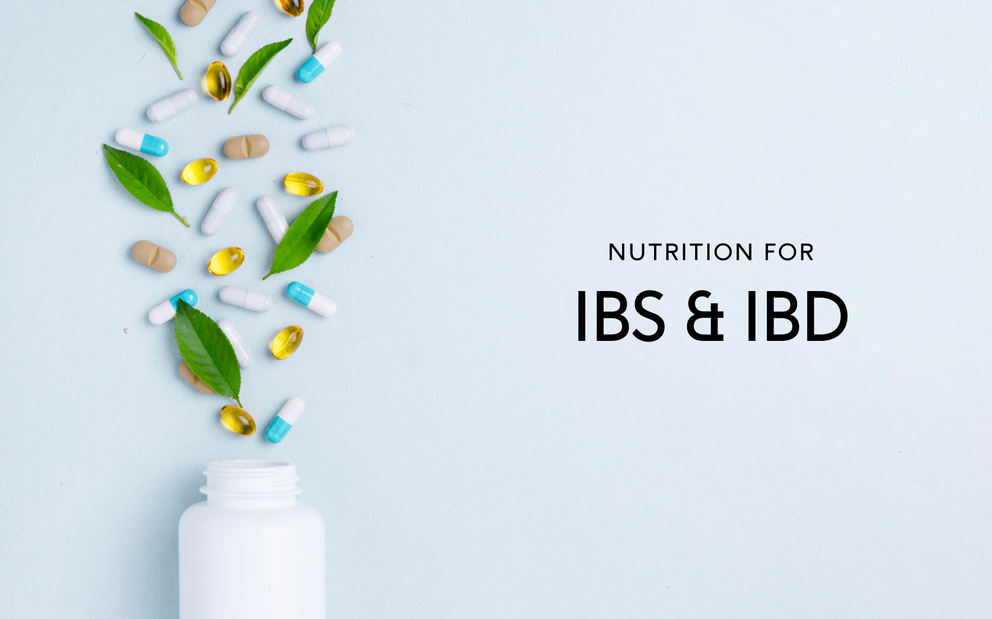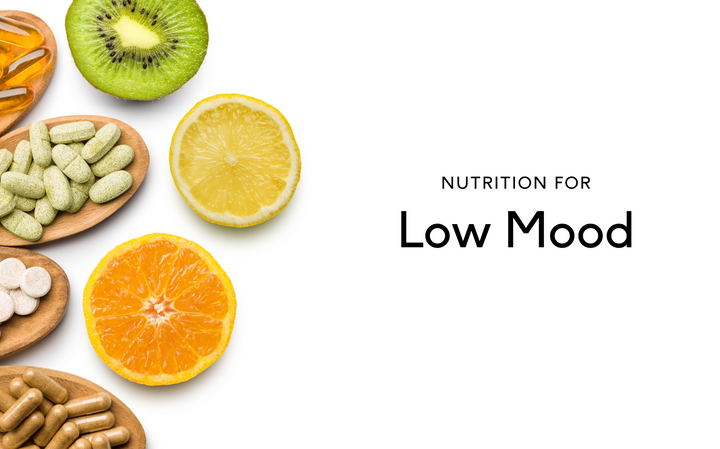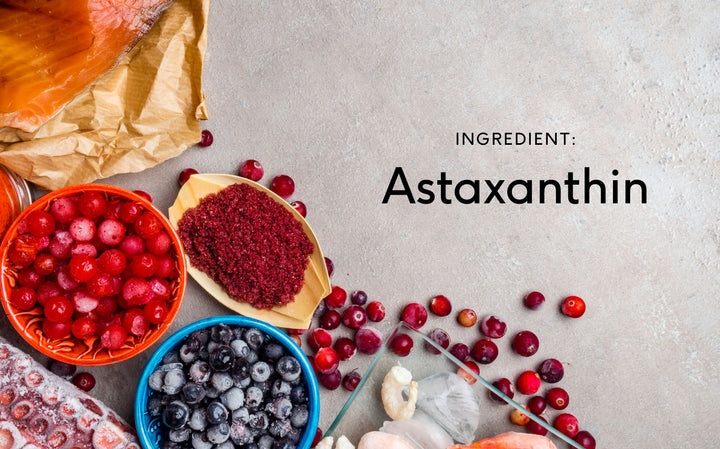Best Vitamins and Minerals for IBS and IBD [2025 Nutritionist Reviewed]
Sarah is a Clinical Nutritionist who holds a degree in Nutritional Medicine. She focuses on the gut-brain connection and its influence on mental health and brain-based disorders.
Sarah is a Clinical Nutritionist who holds a degree in Nutritional Medicine. She focuses on the gut-brain connection and its influence on mental health and brain-based disorders.
Table of contents

| Symptoms of IBS | Bloating, cramping, diarrhoea, and/or constipation |
| Symptoms of IBD | Normally associated with Crohn’s disease and Ulcerative Colitis. Bleeding from the rectum, loose stools, weight loss, and nutritional deficiencies |
| Causes of IBS | Stress, genetics, lifestyle, pro inflammatory diet, food sensitivities, traveller’s diarrhoea, faulty gut-brain connection, antibiotics, Gastroenteritis |
| Causes of IBD | Genetics and autoimmune reactions leading to inflammation |
| What Vitamins can help with IBS and IBD | B vitamins, Vitamin C, Vitamin D, Vitamin A |
| What Minerals can help with IBS and IBD | Zinc, Iron, Manganese, Calcium and Magnesium |
| What additional ingredients can help with IBS and IBD | Ginger, Peppermint, Turmeric, Slippery Elm, Dandelion, Fennel, Berberine, Aloe Vera, Digestive Enzymes, Guar Gum, Psyllium, Probiotics, Prebiotics, Omega-3 fatty acids. |
1. What are IBD and IBS and how do they differ?
Inflammatory bowel disease (IBD) is a disease while irritable bowel syndrome (IBS) is a syndrome, or group of symptoms. The causes and treatments differ, but both these conditions are lifelong and have periods of flare-up and remission5.
IBS is a condition that affects the digestive system. Symptoms include bloating, cramping, diarrhoea, and/or constipation26 .There is often no cause found but it is thought to be related to food passing too quickly or too slowly through the gut, stress affecting the nerves of the gut (the gut-brain axis connection), and sometimes food intolerances such as lactose, gluten, or wheat. Symptoms can come and go. There is no known cure, but it can be managed with dietary and lifestyle changes and some medications are available which can help with symptoms1,3,5.
IBD is a term normally encompassing two conditions known as Crohn’s disease and ulcerative colitis. These diseases are characterised by damage and ulceration of the digestive tract. Symptoms include bleeding from the bottom, loose stools, weight loss, and nutritional deficiencies. If it is not controlled with medications, then surgery is often required to remove the part of the bowel that is damaged. There is some evidence suggesting that dietary changes could help with symptoms of IBD, despite the underlying cause being autoimmune2, 4, 6.
2. What causes IBS?
There is often no cause identified and it is more likely to occur in families with a history of IBS1. Possible causes that have been theorised to precipitate IBS include:
- Gastroenteritis – 10% of IBS sufferers develop symptoms after a stomach bug.
- Changes in the gut microbiome - such as taking antibiotics can disrupt the normal gut microflora.
- Increased gut sensitivity – problems with the nervous system such as excess stress and anxiety. can make some people ultra-sensitive to everyday abdominal changes.
- A faulty gut-brain connection – the muscles in your intestines move food through the gut but if the messages between the gut and brain become disrupted, food may pass through too quickly (diarrhoea) or too slowly (constipation)5, 26.
Factors that can increase your risk of developing IBS include26:
- Travellers’ diarrhoea/food poisoning
- Gender (females are more likely to suffer from IBS than males)
- History of anxiety or depression
- Stress
- Genetics
There is a link between a pro-inflammatory diet and the development of IBS. Reported common IBS trigger foods include3, 4, 6, 47:
- Legumes such as beans, lentils
- Brassicas such as cabbage and kale
- Onions
- Sugars such fructose and lactose
- Wheat and/or gluten
- Barley
- Oats
- Nuts, seeds and popcorn
- High fat foods
- Caffeine
- Alcohol
- Spicy foods
- Raw fruits and vegetables
- Prunes
A systematic review published in 2021 of various clinical trials has suggested a low FODMAP diet is the first line of treatment and then a trial of medications as the second line. If these are unsuccessful, psychological therapies such as cognitive behavioural therapy and gut-directed hypnotherapy may be helpful.
3. What causes IBD?
IBD is thought to be caused by a combination of factors, the main ones being genetics and autoimmune reactions leading to inflammation. Lifestyle factors may play a role too. People who smoke are twice as likely to develop Crohn's disease than non-smokers2, 7.
Normally there is no reason to avoid any food in IBD but there are reports some foods may trigger symptoms in some people. People with IBD are often advised to avoid alcohol, caffeine, and spicy foods which can irritate the colon. Foods high in fat, dairy products, sugars and wholegrain fibres can be difficult to digest so it may be better to have these in moderation 5, 7.
People diagnosed with IBD and IBS can be referred to a registered Dietitian who can advise in more detail based on an individual’s diet and nutrient intake to ensure there is no risk of nutritional deficiencies with dietary changes7, 8, 9.
4. What vitamins are good for IBS and IBD?
It is important for those with IBS and IBD who have malabsorption (e.g. diarrhoea, weight loss) and/or a very restricted diet to be assessed for micronutrient deficiencies. Treatment with the appropriate nutrient supplementation may be needed to reduce the risks of complications8, 20, 17.
- The B vitamins group (Thiamine, Niacin, Pyridoxine, Biotin, Cobalamin, Folic acid) has been found to be important for the digestive system and help the metabolism of carbohydrates, protein, and fatty acids, into energy for your cells and helps regulate appetite. A study published in 2011 found that subjects who consumed the lowest amount of Vitamin B-6 reported more frequent and severe IBS symptoms. Additionally, the use of Sulfasalazine and Methotrexate medications may result in Folate deficiency. IBD patients taking these drugs are prescribed Folate tablets while on these medications21.
- Vitamin C is an antioxidant that helps the immune system and is an essential vitamin for digestion by supporting healthy teeth and gums and helping the absorption of Iron20.
- Vitamin D helps the body absorb Calcium and is required for nerves, muscles, and immune system function. Healthy levels of Vitamin D have been found to be associated with a reduced risk of colon cancer, according to a 2015 study. There are Vitamin D receptors located in the colon that help regulate bowel inflammation. A lack of Vitamin D could interfere with this mechanism. Vitamin D also has a role in the production of the neurotransmitter serotonin, It is thought this may be why people with IBS are also more likely to be depressed and rate a low quality of life. It has been estimated that 82% of IBS sufferers are low in Vitamin D.
- Vitamin A- Gut researchers also noted that low Vitamin A levels can lead to an imbalance between the formation and destruction of free radicals in the intestinal mucus lining of people with Crohn's disease12, 13, 14, 15, 16.
5. What minerals are good for IBS and IBD?
Some minerals that have been found to play an important role in IBS and IBD include:
- Manganese- this helps to make and activate some enzymes needed for breaking down food. Some animal studies have shown Manganese supplementation may help in the prevention and treatment of IBD by its effect on inflammation and intestinal permeability17, 25.
- Zinc- is involved in many aspects of cellular metabolism, DNA and protein synthesis, enzyme production, immunity, and wound healing. Zinc may be lost through diarrhoea, and Zinc deficiency can occur in people who have IBD22, 23.
- Iron- Iron deficiency anaemia is the most common symptom in those with IBD. The long-term irritation and swelling in the intestines interfere with the body's ability to absorb and use Iron properly18, 24.
- Calcium and Magnesium- Calcium tablets can help to relieve diarrhoeal symptoms and conversely Magnesium can help with constipation symptoms3, 14, 18, 19, 20.
6. What botanicals or other ingredients are good for IBS and IBD?
There are many other natural supplements that have shown potential in helping with bowel function in IBS and IBD and GI symptoms such as:
- Ginger- many people use Ginger for symptoms such nausea, bloating and abdominal cramps. The scientific evidence is limited but there is anecdotal evidence of its efficacy3, 29, 45.
- Peppermint oil- studies have shown a 58% success rate using Peppermint oil for IBS symptom relief3, 29.
- Melatonin- Melatonin is a hormone produced by the pineal gland that helps with sleep regulation and digestion. Studies have found 3mg of Melatonin a day led to an improvement in IBS symptoms37.
- Carob powder - this can be used for diarrhoea (one tablespoonful of carob powder mixed with applesauce and honey) can help an irritated gut27.
- Turmeric- Turmeric is a spice that has been recommended to reduce IBS symptoms. Tumeric contains Curcumin which is a type of Curcuminoid, a group of natural compounds found in the Turmeric root. A study published in 2004 found 50% of participants reported Turmeric helped to reduce their pain and cramping by reducing inflammation and abnormal muscle contractions26, 28.
- Slippery Elm- known as Ulmus rubra is extracted from the inner bark of the red elm tree. Its powder form can help with cramping and pain of the contractions in the bowel3, 26.
- Chinese Herbal Preparations - this includes herbs like Dang Shen, Bupleurum, and Magnolia Bark which can help anxiety and depression symptoms thus impacting the gut-brain axis connection in IBS3.
- Dandelion - Dandelion contains a large amount of inulin which is a prebiotic and helps improve gut bacterial flora32.
- Aloe vera- Aloe vera (a polyphenol known as Asca-feoilquinic acid) has been used for hundreds of years for its hepato-protective, anti-inflammatory, and anti-ulcerative benefits3.
- Polyphenol and Flavonoids- such as Artichoke (Cynara scolymus) and Fennel have anti-inflammatory effects on the gut38.
- Digestive Enzymes - such as Lactase, and Alpha-galactosidase are needed to help break down food for the digestive system to absorb them. For those who follow a restrictive low FODMAP diet, these enzyme supplements can increase the variety of their diet3, 31.
- Berberine - Berberine is a plant-derived dye with medicinal properties and historically has been used as an antibiotic in traditional Chinese medicine. Now modern medical science has shown it has pain-relieving and anti-inflammatory effects which can help with GI symptoms28.
- Methylcellulose, Calcium-polycarbophil, Guar gum and Pysllium- are soluble fibres that slow stool transit time and help prevent diarrhoea. Soluble fibers prevent constipation as it softens the stool and helps it move through more easily and can help with hyperlipidaemia. Soluble fibres also help to balance the acidity level in the intestines3, 30, 33, 34.
- Prebiotics, Probiotics, Synbiotics - including Bifidobacterium, Lactobacilli, S. boulardii, B. coagulans and Prebiotics like FOS, GOS, XOS, Inulin and Fructans. Synbiotics are a combination of a Probiotic and its food source such as Lactobacilli with Lactose in dairy foods. These help balance gut microflora and have protective effects on the GI tract3, 35, 47.
- Herbal Stimulant Laxatives - this includes a group of substances known as Anthraquinones. These are used as stimulant laxatives and help increase bowel motility for the treatment of constipation. Examples include Senna, Cascara, Rhubarb, and Frangula36
- Omega-3 Fatty Acid - Essential Fatty Acid deficiency has been associated with abdominal pain in IBS41.
7. When is best to take vitamins and minerals for IBS and IBD?
Remember to always check with your doctor or healthcare providers before taking any supplements, including over-the-counter medications, herbs, and other complementary treatments24.
Always check the label and dosage instructions of all supplements and medications. Most supplements should not be taken on an empty stomach. Check for ingredients that may aggravate IBS/IBS symptoms such as lactose, artificial colours, sugar alcohols, or preservatives. Vitamin and Mineral supplements can cause GI symptoms, including nausea and diarrhoea39. Calcium is most effective when it is taken together with Vitamin D and Vitamin C helps absorb Iron when taken together24.
8. When is best to take additional ingredients for IBS and IBD? (botanicals etc)
They are normally taken with meals but always check the individual supplement dosage instructions. Anthraquinone herbal laxatives such as Senna should be taken in the evening to allow for a healthy bowel movement in the morning36.
Soluble fibre supplements are best taken with plenty of fluid to help the formation of a gel in your intestine to soften stools36, 47, 49. Curcumin and Fennel have been found to be more effective when taken combined 38, 39.
Note- Melatonin is usually not available without a prescription. Check with your pharmacist about administration and dosage instructions. It is available as modified-release tablets which should be taken with or after food while immediate-release formulations should be taken on an empty stomach, two hours before or two hours after food. The dosage used in clinical studies was 3mg3, 37.
9. Are there any other dietary or lifestyle factors that can help reduce IBS, IBD, and bloating?
One study looking at a group of people with IBS found as part of the usual treatment of IBS, that practicing yoga and meditation twice a week had the same benefits as following a low FODMAP diet in improving gut symptoms, with 80% of people reporting significant improvement to their symptoms26.
Some of the exercises used in yoga practice involve the following:
- Deep Breathing - this activates the 'rest and digest' (parasympathetic) nervous system.
- Stretching and compression yoga exercises can help with trapped gas and bloating
- Mindfulness is all about focusing on the present moment and learning to embrace uncomfortable feelings in the body and help with symptoms
- Relaxation techniques activate the parasympathetic nervous system promoting relaxation and improving the connection between the gut and brain10, 11, 26.
10. How much of certain vitamins and minerals or herbal supplements do I have to take to reduce IBS or IBD symptoms?
Different formulations and preparations vary in dosage instructions. Always read the label first. It is also worth noting that the amounts needed would depend on the individual, but generally speaking these are the daily requirements for Vitamins and Minerals that may help IBS/IBD symptoms:
- Vitamin B6 (Pyridoxine)- 1.3 and 1.7mg a day.
- B1 (Thiamin) 0.8-1mg a day
- B2 (Riboflavin) 1.1-1.3mg a day
- B3 (Niacin) 13.2-16.5mg a day
- Biotin up 0.9mg a day
- B12 (Cobalamin) 1.5mcg a day
- Folate 200-500mg a day
- Vitamin C up to 1000mg a day
- Vitamin D 10mcg a day (400 units)
- Vitamin A 600-700micrograms a day
- Calcium 700mg a day
- Iron 8.7-14.8mg a day
- Magnesium 270-300mg a day
- Manganese up to 0.5mg a day
Other Supplements:
Probiotics - the most effective strains of probiotics are Lactobacillus and Bifidobacterium 10-20 billion CFUs per dose29, 41.
Digestive enzymes (plant-derived)
- Bromelain 400mg per day by mouth
- Chymotrypsin 100,000U USP four times daily by mouth
- Papain 1,500mg per day by mouth
- Trypsin 50mg, combined with bromelain42, 46, 49
Aloe Vera- for constipation dose 100-200mg of Aloe Vera juice (50mg of aloe vera extract)43
Slippery Elm - dose 300 to 400 mg tablets up to three times a day27.
Buffered Vitamin C for constipation- this is a combination of Vitamin C, Potassium, and Magnesium. It should be mixed with a glass of water and taken on an empty stomach. The effervescent powder should be mixed with 200mls of water and it can induce a bowel movement in 30 to 90 minutes.
Peppermint oil - dose180-200 mg enteric-coated tablet of Peppermint oil was used in research studies3, 5, 29.
Turmeric- expert opinion has suggested dosage of 300 to 400 mg tablets up to three times a day27.
Soluble Fibre Supplements - the daily requirement of fibre is 30g a day in the UK. The US recommends 14g of soluble fibre for every 1,000 calories (28g a day.). Although, these fibre guidelines refer to dietary intake rather than the fibre supplements44, 48.
11. How long does it take for the ingredients to work for reducing IBS or IBD?
Most clinical studies used a duration of around 21-30 days before the effects were seen17, 21, 25, 35. For Vitamin and Mineral supplementation, if you are deficient it will take longer to see the effect as your body will need to replenish stores to a therapeutic level21, 22, 23, 25.
If taking supplements to help with constipation the effect will depend on the product. Magnesium supplements and Anthraquinone can work quickly within 12-24 hours however Soluble Fibre supplements may take up to 48 hours. Everyone is different and some people have slower gut transit than others47, 49.
12. Possible side-effects of taking supplements for IBS or IBD?
All the herbal supplements mentioned have the potential to cause allergic reactions, and may also cause mild stomach upset, diarrohea, and bloating for the first few days after starting to take them. For those with IBD it would be best to discuss supplements with your doctor especially if you taking immunosuppressant medication such as Azathioprine48.
Those with reduced immunity should avoid Probiotic supplements42, 35, 48. Digestive Enzymes may cause loose stools and tummy upset if too many are taken48, 49.
Too much fibre can sometimes make bloating and cramp worse. Increase your fibre intake slowly over a few days or weeks and take plenty of fluid. If your symptoms don’t get better, talk to your doctor10, 11, 44, 47, 48.
When taking Vitamin and Mineral supplements ensure you are not exceeding the maximum tolerated dose as some excess Vitamins and Minerals can be dangerous e.g. Vitamin A, Iron40.
13. Are there any interactions or contraindications with ingredients for IBS or IBD?
As stated above, caution is advised with Probiotics in those with reduced immunity due to the risk of infection48.
Those with liver and kidney disease should not take over-the-counter herbal supplements or products without checking with their doctor first due to the risks of toxicity36. Slippery Elm extract can cause skin irritation48. Anthraquinone Herbal Laxatives such as Senna should not be used for more than one week as overuse may increase the risk of liver toxicity and over-usage can lead to ‘lazy’ bowel36.
Danshen can interact with some heart medicines and blood thinners such as Warfarin, Aspirin, Calcium Channel Blockers, and Digoxin48.
Avoid all Herbal Supplements if you are pregnant or breastfeeding as there is no data on their safety for this group.
References
1.https://www.nhs.uk/conditions/irritable-bowel-syndrome-ibs/
2. https://www.nhs.uk/conditions/inflammatory-bowel-disease/
3.https://www.healthline.com/health/irritable-bowel-syndrome/5-natural-products-for-ibs
4.https://www.uhhospitals.org/services/Digestive-health-services/Conditions-and-treatments/small-and-large-intestine/inflammatory-bowel-disease/diet-guide
5.https://www.hollandandbarrett.com/the-health-hub/conditions/digestive-health/ibs/what-is-irritable-bowel-syndrome/
6.https://www.iowaclinic.com/gastroenterology/ibd-food-what-eat/
7. https://my.clevelandclinic.org/health/diseases/15587-inflammatory-bowel-disease-overview
8. https://www.nice.org.uk/Guidance/CG61
9. https://www.bda.uk.com/resource/irritable-bowel-syndrome-diet.html
10.https://www.nhs.uk/conditions/bloating/
11. https://www.healthline.com/health/abdominal-bloating#_noHeaderPrefixedContent
13. https://www.everydayhealth.com/digestive-health/essential-vitamins-for-digestive-health.aspx
14. https://www.prevention.com/health/a20498506/ibs-and-vitamin-deficiency/
15. https://www.livestrong.com/article/275768-what-vitamins-work-best-for-irritable-bowel-syndrome/
16. https://www.bladderandbowel.org/news/low-vitamin-d-levels-associated-with-ibs/
18. https://www.healthline.com/nutrition/supplements-for-bloating
19. https://www.simplysupplements.co.uk/healthylife/digestive-disorders/natural-remedies-for-ibs
21. https://www.ncbi.nlm.nih.gov/pmc/articles/PMC8618862/
25. https://www.ncbi.nlm.nih.gov/pmc/articles/PMC8103308/
27. https://www.drweil.com/health-wellness/body-mind-spirit/gastrointestinal/irritable-bowel-syndrome-ibs-symptoms-treatments/
29. https://takecareof.com/articles/best-supplements-for-bloating
30. https://www.verywellhealth.com/best-supplements-for-ibs-7097416
32. https://www.oswalddigestiveclinic.com/3-reasons-eating-dandelions-could-help-your-gut-health
33. https://ibstreatmentcenter.com/ibs/why-traditional-treatments-dont-work/fiber/
34. https://einstein.pure.elsevier.com/en/publications/psyllium-versus-guar-gum-facts-and-comparisons-2
35. https://www.ncbi.nlm.nih.gov/pmc/articles/PMC8473929/
36. https://www.verywellhealth.com/herbs-and-natural-remedies-for-ibs-1944988
37. https://bnf.nice.org.uk/drugs/melatonin/
38. https://www.ncbi.nlm.nih.gov/pmc/articles/PMC6895345/
39. https://pubmed.ncbi.nlm.nih.gov/27308645/
40. https://www.nhs.uk/conditions/vitamins-and-minerals/
42. https://www.verywellhealth.com/the-benefits-of-digestive-enzymes-89446
43. https://www.webmd.com/diet/supplement-guide-aloe-vera
44. https://healthyeating.sfgate.com/dosage-timing-soluble-fiber-10933.html
45. https://www.medicalnewstoday.com/articles/322525#outlook
46. https://www.ncbi.nlm.nih.gov/pmc/articles/PMC4094108/
47. https://www.webmd.com/ibs/supplements-help-ibs
49. https://www.mindbodygreen.com/articles/best-supplements-for-digestive-issues























































 Back
Back



